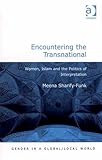Encountering the Transnational : Women, Islam and the Politics of Interpretation.
Material type: TextSeries: Gender in a Global/Local World SerPublisher: Farnham : Routledge, 2008Copyright date: ©2013Edition: 1st edDescription: 1 online resource (218 pages)Content type: text Media type: computer Carrier type: online resourceISBN: 9780754686422Subject(s): Islam -- 21st century | Islam and civil society | Islamic modernism | Muslim women | Women in IslamGenre/Form: Electronic books.Additional physical formats: Print version:: Encountering the Transnational : Women, Islam and the Politics of InterpretationDDC classification: 305.48 LOC classification: HQ1170 -- .S4623 2008ebOnline resources: Click to View
TextSeries: Gender in a Global/Local World SerPublisher: Farnham : Routledge, 2008Copyright date: ©2013Edition: 1st edDescription: 1 online resource (218 pages)Content type: text Media type: computer Carrier type: online resourceISBN: 9780754686422Subject(s): Islam -- 21st century | Islam and civil society | Islamic modernism | Muslim women | Women in IslamGenre/Form: Electronic books.Additional physical formats: Print version:: Encountering the Transnational : Women, Islam and the Politics of InterpretationDDC classification: 305.48 LOC classification: HQ1170 -- .S4623 2008ebOnline resources: Click to View Cover -- Contents -- List of Figures -- Preface -- Acknowledgements -- 1 Introduction -- 2 Mixed Messages and Multiple Agendas: The Politics of 'Women and Islam' -- 3 Trends and Transformations in Contemporary Islamic Hermeneutics -- 4 Identity and Interpretation: Dialogue and the Negotiation of Meaning -- 5 The Transnational and the Politics of Community -- 6 Muslim Society and State: The Politics of Public Space -- 7 Muslim Woman as Self/Other: The Politics of Identity -- 8 Conclusion: A Space for Connectivity and Dynamism -- Appendix -- Bibliography -- Index -- A -- B -- C -- D -- E -- F -- G -- H -- I -- J -- K -- L -- M -- N -- O -- P -- Q -- R -- S -- T -- U -- V -- W -- Y -- Z.
When Muslim women from diverse national and cultural contexts meet one another through transnational dialogue and networking, what happens to their sense of identity and social agency? Addressing this question, Meena Sharify-Funk encountered women activists and intellectuals in North America, the Middle East, South Asia and Southeast Asia - women whose lives and visions have become linked by 'the transnational' despite their differing circumstances and intellectual backgrounds. The resultant work provides a rich and cliché-bursting account of women's reflections on a wide range of topics including: the status of women in Islam, the role of women as interpreters of religious norms, the relationship between secular and religious forms of self-identification, perceptions of Islamic-Western relations, experiences of marginalization, and opportunities for empowerment. Giving careful attention both to common threads in Muslim women's experiences and to the unique voices of remarkable women, this is a compelling account of conversations that are bringing new energy and dynamism into women's activism in a world of collapsing distances.
Description based on publisher supplied metadata and other sources.
Electronic reproduction. Ann Arbor, Michigan : ProQuest Ebook Central, 2018. Available via World Wide Web. Access may be limited to ProQuest Ebook Central affiliated libraries.

There are no comments on this title.